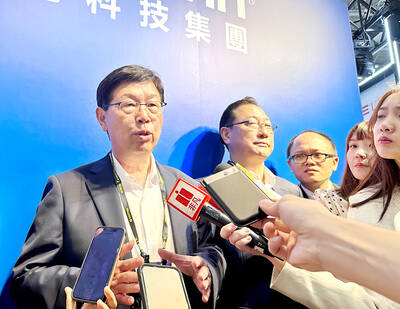Scottish firm John Menzies said it was in talks to sell its distribution business to British mail delivery firm DX Group, responding to calls by top investors to separate the unit from its airport services business.
DX Group proposed to pay £60 million (US$74.8 million) in cash and new ordinary shares, which would represent 80 percent of DX’s issued share capital after the deal closes, the companies said in a statement yesterday.
John Menzies’s shares rose as much as 11.2 percent to £7.06 on the London Stock Exchange, touching their highest since November 2013.
The company has been under pressure to revamp its business as a string of warnings and departures of top executives drew criticism from three investors who advocated separating its aviation services and print media distribution units.
Activist investor Shareholder Value Management (SVM) took a 7 percent stake in Menzies last year and urged the company to break up its businesses. saying they would be worth more if split.
John Menzies has been aiming to expand the aviation support business, which provides cargo and baggage handling and freight forwarding services, and brings in most of its profits, as its once core newspaper and magazine distribution business continues to dip.
The merger deal will see Greg Michael, managing director of John Menzies’ distribution unit, take over as the chief executive of DX Group, and Paul McCourt, the unit’s finance director, become DX Group’s chief financial officer.
The companies said the deal would constitute a reverse takeover by DX and its ordinary shares are expected to be suspended from trading on London’s Alternative Investment Market, effective yesterday.
The deal would generate cost synergies of between £8 million and £12 million each year and be completed in the summer, they said.

Taiwan Transport and Storage Corp (TTS, 台灣通運倉儲) yesterday unveiled its first electric tractor unit — manufactured by Volvo Trucks — in a ceremony in Taipei, and said the unit would soon be used to transport cement produced by Taiwan Cement Corp (TCC, 台灣水泥). Both TTS and TCC belong to TCC International Holdings Ltd (台泥國際集團). With the electric tractor unit, the Taipei-based cement firm would become the first in Taiwan to use electric vehicles to transport construction materials. TTS chairman Koo Kung-yi (辜公怡), Volvo Trucks vice president of sales and marketing Johan Selven, TCC president Roman Cheng (程耀輝) and Taikoo Motors Group

Among the rows of vibrators, rubber torsos and leather harnesses at a Chinese sex toys exhibition in Shanghai this weekend, the beginnings of an artificial intelligence (AI)-driven shift in the industry quietly pulsed. China manufactures about 70 percent of the world’s sex toys, most of it the “hardware” on display at the fair — whether that be technicolor tentacled dildos or hyper-realistic personalized silicone dolls. Yet smart toys have been rising in popularity for some time. Many major European and US brands already offer tech-enhanced products that can enable long-distance love, monitor well-being and even bring people one step closer to

RECORD-BREAKING: TSMC’s net profit last quarter beat market expectations by expanding 8.9% and it was the best first-quarter profit in the chipmaker’s history Taiwan Semiconductor Manufacturing Co (TSMC, 台積電), which counts Nvidia Corp as a key customer, yesterday said that artificial intelligence (AI) server chip revenue is set to more than double this year from last year amid rising demand. The chipmaker expects the growth momentum to continue in the next five years with an annual compound growth rate of 50 percent, TSMC chief executive officer C.C. Wei (魏哲家) told investors yesterday. By 2028, AI chips’ contribution to revenue would climb to about 20 percent from a percentage in the low teens, Wei said. “Almost all the AI innovators are working with TSMC to address the

FUTURE PLANS: Although the electric vehicle market is getting more competitive, Hon Hai would stick to its goal of seizing a 5 percent share globally, Young Liu said Hon Hai Precision Industry Co (鴻海精密), a major iPhone assembler and supplier of artificial intelligence (AI) servers powered by Nvidia Corp’s chips, yesterday said it has introduced a rotating chief executive structure as part of the company’s efforts to cultivate future leaders and to enhance corporate governance. The 50-year-old contract electronics maker reported sizable revenue of NT$6.16 trillion (US$189.67 billion) last year. Hon Hai, also known as Foxconn Technology Group (富士康科技集團), has been under the control of one man almost since its inception. A rotating CEO system is a rarity among Taiwanese businesses. Hon Hai has given leaders of the company’s six